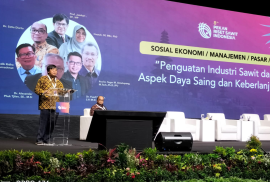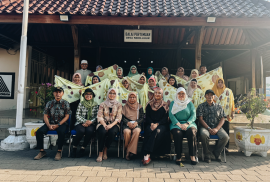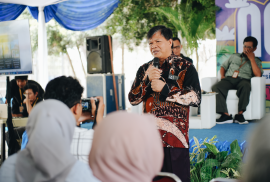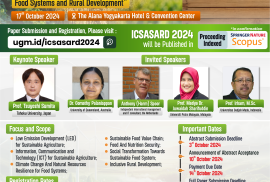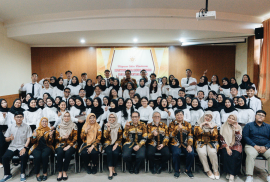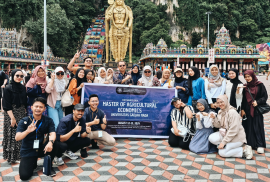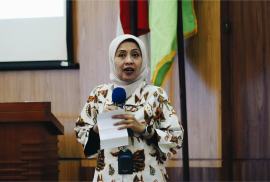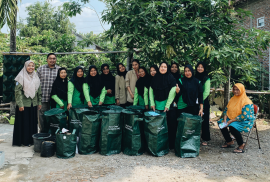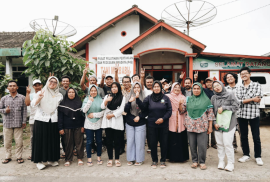On October 3-4, 2024, Prof. Dr. Jamhari, S.P., M.P., a Professor from the Agricultural Economics and Agribusiness Study Program, Department of Agricultural Socio-Economics, Faculty of Agriculture UGM, was invited as a speaker at the 8th Indonesian Palm Oil Research Week (PERISAI) 2024. The event, held in Nusa Dua, Bali, carried the theme “Green Gold: Transforming Palm Oil Industry through Cutting-Edge Technologies” and aimed to showcase the latest research innovations to stakeholders in the palm oil industry, including government, private sectors, academia, and the broader public.
NEWS
The Agricultural Extension and Communication Study Program, part of the Department of Agricultural Socio-Economics at Universitas Gadjah Mada (UGM), recently conducted a community service program in Sidoluhur Village, Sleman Regency. This initiative is part of the program’s commitment to supporting inclusive development by empowering communities through a local agro-economy approach. The activities included ecoprint training and the distribution of plant seedlings, with a focus on sustainability and empowering members of the “Luhur Jiwo” community, a group that provides opportunities for individuals with psychosocial disabilities (ODGP) to engage in productive and social activities.
From September 5-7, 2024, AgriFest 2024 was successfully organized by the UGM Center for Agro-Technology Innovation (PIAT) as part of the 15th UGM lustrum celebration. With the theme “Seeding Ideas, Growing Future: Adapting to the Era of Technological Disruption in the Agricultural Sector to Achieve National Food Security”, the event attracted around 600 participants daily and featured a variety of activities, such as a National Talkshow, Best Practice Talkshow, Workshops, Exhibitions, Healthy Exercises, a Rice Dish Innovation Competition, and more.
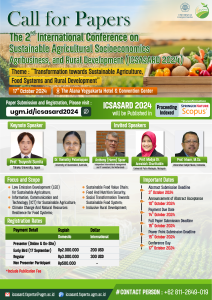
📢 [CALL FOR CONTRIBUTIVE PARTICIPATION] 📢
Let’s foster change by submitting your Paper to the 2nd International Conference on Sustainable Agricultural Socioeconomics, Agribusiness, and Rural Development 🌱✨
This year we focus on “Transformation towards Sustainable Agriculture, Food Systems and Rural Development”. We will explore a wide array of topics, including sustainable farming practices, the entire production-to-consumption chain, and strategies for economic, social, and environmental advancement in rural regions ⛓🌱💹
On Wednesday, August 28, 2024, a total of 70 students from the Agricultural Socio-Economics Department, Faculty of Agriculture, Universitas Gadjah Mada (UGM), officially completed their undergraduate studies. The graduation ceremony took place at Grha Sabha Pramana (GSP) and was followed by the transcript distribution at Harjono Danoesastro Auditorium, Faculty of Agriculture. This period marks the department’s highest number of graduates in its history.
Several graduates achieved remarkable success. Anna Tria Nita was named the best graduate of the Faculty of Agriculture with a GPA of 3.96, while Rahadian Luthfianisa Maghfirah was honored as the best graduate of the department with a GPA of 3.95. Four students—Aulia Putri Nur Cahyani, Aisyah Fatikah Nur Ghani, Klaudia Alfa Wijaya br Tarigan, and Anggun Pramudita—completed their studies in record time, finishing in just 3 years, 7 months, and 16 days.
On Tuesday, August 27, 2024, the Department of Agricultural Socio-Economics (Sosek) at UGM held a graduation ceremony for undergraduate students in the IV Academic Year 2023/2024. The event took place in the MMA Auditorium, Building A10, 3rd floor, and was attended by 70 prospective graduates, consisting of 52 students from the Agricultural Economics and Agribusiness Study Program and 18 students from the Agricultural Extension and Communication Study Program.
The ceremony, which began at 1:00 PM, was an important moment to appreciate the academic achievements of the prospective graduates. In his speech, Dr. Jangkung Handoyo Mulyo, M.Ec., the Head of the Sosek Department, emphasized the importance of maintaining the good name of the alma mater and reminded the prospective graduates to continue contributing positively to society. He also praised the remarkable achievement of this period, where 67 out of 70 prospective graduates achieved cum laude honors, making it the graduation period with the highest number of cum laude graduates.
From August 12-15, 2024, students from the 23rd batch of the Master of Agricultural Economics (MEP) program at the Department of Agricultural Socioeconomics, Faculty of Agriculture, UGM, conducted a study tour (widyakarya) to Malaysia. This activity was part of a mandatory course aimed at broadening students’ perspectives by visiting prominent institutions in Malaysia, such as the Malaysian Palm Oil Board (MPOB), Beryl’s, and the Malaysian Agricultural Research and Development Institute (MARDI).
On Monday, August 19, 2024, the Department of Socio-Economic Agriculture (Sosek) at the Faculty of Agriculture, UGM, held an Orientation for New Students and Financial Literacy Seminar at the Harjono Danoesastro Auditorium. This event was an important step in introducing new students to the Sosek academic environment while providing valuable insights into effective financial management in the digital age.
In this event, Sosek collaborated with Bank Mandiri to feature Ibu Evi Mariati, S.P., an alumni of the Department of Sosek, as the main speaker. Ibu Evi, accompanied by Bapak Daniel and Ibu Yulia Ayu, delivered content focused on the importance of financial literacy and prudent financial management. The new students attended the various sessions with high enthusiasm, gaining knowledge and skills necessary for effective and secure financial management.
On July 7, 2024, a team of lecturers from the Faculty of Agriculture UGM carried out a community service activity in Dusun Ngariboyo, Desa Kepuh, Kecamatan Nguter, Kabupaten Sukoharjo. This activity focused on the utilization of home gardens for vegetable cultivation, with the goal of enhancing food security and community well-being through the optimization of local resources.
The participating lecturers included Hariyani Dw Anjani, S.P., M.Sc., and Asih Kusumaningsih, S.P., M.Sc. from the Department of Social Economics Agriculture, as well as Dr. Ega Adhi Wicaksono from the Department of Fisheries. They provided outreach on the importance of home garden utilization and guided practical sessions covering seedling practices, land preparation, vegetable planting, plant care, and compost production. Additionally, the community was taught how to make compost, which is a crucial step in supporting sustainable agriculture.
On Tuesday, August 6, 2024, lecturers from the Department of Agricultural Socio-Economics, Faculty of Agriculture, UGM, conducted a community service activity at the Pusat Pelatihan Pertanian dan Perdesaan Swadaya (P4S) Tani Merbabu, Ngablak, Magelang. This activity, themed “Training on Digital Farming Recordkeeping and Stacked Buckets for Composting,” aimed to provide farmers with new knowledge and skills in digitally recording their farming activities and utilizing simple technology for composting.

